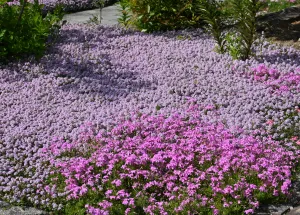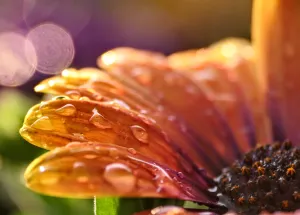
Drought Tolerant Lawns
A Beautiful Lawn with Less Water
Enjoy a lush, green lawn while reducing the amount of water you use. You can even enjoy a beautiful lawn while only watering once a week during certain times of the year. All it takes is attention to weather patterns and following a few simple watering practices.
During the heat of summer, you can get by with a nice, deep watering twice a week if necessary. During winter, your sprinkler schedule can be reduced to once a week. Follow the below tips and start being water smart.
Marathon & Cool Season Lawns
- Water early in the morning between 4-8am. Water will not be wasted, since it won't evaporate in the sun. (Watering during the evening can create conditions where lawns are more disease-prone.)
- Give a deep watering. The goal is to have the water really penetrate the roots to encourage deep root development that is stronger and more drought tolerant. Water your lawn until just before you see runoff.
- Don't over-feed. Feed lightly and more frequently. A lawn pumped with fertilizer promotes lots of growth which requires more water to support. Or, simply use organic lawn food consistently. We recommend E.B Stone Lawn Food. The nutrients are released slowly, just enough to keep your lawn looking healthy and green.
- Don't catch your lawn clippings. Let them fall into your turf. This will provide a water-conserving mulch.
- When raining, manually turn sprinklers off for as long as the soil stays moist.
St. Augustine & Bermuda Warm Season Lawns
- Water early in the morning between 4-8am. Water will not be wasted, since it won't evaporate in the sun. (Watering during the evening can create conditions where lawns are more disease-prone.)
- Give a deep watering. The goal is to have the water really penetrate the roots to encourage deep root development that is stronger and more drought tolerant. Water your lawn until just before you see runoff.
- Continue to mow, leaving the clippings on the lawn, providing a water-conserving mulch.
- Don't over-seed with winter rye. A well-fed (following the schedule above) warm-season lawn turns rich, bronzy green rather than brown during dormancy.
- When raining, manually turn sprinklers off for as long as the soil stays moist.
- Adjust your fertilizer schedule. Start feeding your lawn in early March for an early green-up and continue through summer with light feedings with an organic fertilizer. We recommend E.B Stone Lawn Food. Then give a full fertilizer application in November and December.




